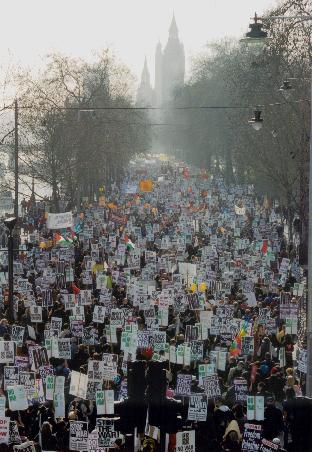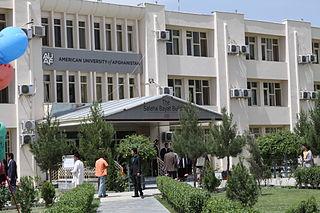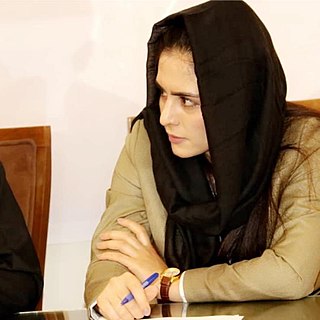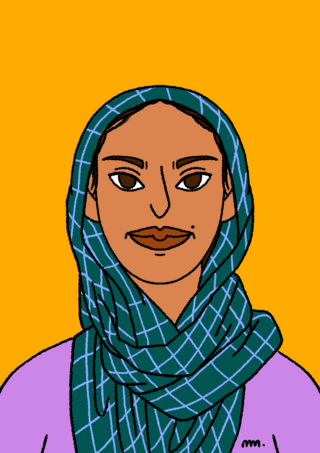Related Research Articles

The treatment of women by the Taliban refers to actions and policies by various Taliban regimes which are either specific or highly commented upon, mostly due to discrimination, since they first took control in 1996. During their first rule of Afghanistan (1996–2001), the Taliban were notorious internationally for their misogyny and violence against women. Since 1996, women were mandated to wear the burqa at all times in public. In a systematic segregation sometimes referred to as gender apartheid, women were not allowed to work, nor were they allowed to be educated after the age of eight. Women seeking an education were forced to attend underground schools, where they and their teachers risked execution if caught. They were not allowed to be treated by male doctors unless accompanied by a male chaperone, which led to illnesses remaining untreated. They faced public flogging and execution for violations of the Taliban's laws. The Taliban allowed, and in some cases encouraged, marriage for girls under the age of 16. Amnesty International reported that 80 per cent of Afghan marriages were forced.

Beginning in late 2002, and continuing after the 2003 invasion of Iraq, large-scale protests against the Iraq War were held in many cities worldwide, often coordinated to occur simultaneously around the world. After the biggest series of demonstrations, on February 15, 2003, New York Times writer Patrick Tyler claimed that they showed that there were two superpowers on the planet: the United States and worldwide public opinion.

Quran desecration is the treatment of the Quran, in its original Arabic form, in a way that might be considered disrespectful or insulting.

The proposed invasion of Afghanistan prompted protests with mass demonstrations in the days leading up to the official launch of the war on October 7, 2001. The continuation of the war in Afghanistan from 2001 to 2021 lead to further protest and opposition to hostilities.

Education in Afghanistan includes K–12 and higher education, which is under the Ministry of Education and Ministry of Higher Education. In 2021, there were nearly 10 million students and 220,000 teachers in Afghanistan. The nation still requires more schools and teachers. Soon after the Taliban takeover of the country in August 2021, they banned girls from secondary education. In December 2022, the Taliban government also prohibited university education and primary education for females in Afghanistan, sparking protests and international condemnation.

Sakena Yacoobi is an Afghani activist known for her work for promoting access to education for women and children. She is the founder and executive director of the women-led NGO Afghan Institute of Learning. For her work, Yacoobi has received international recognition, including the 2013 Opus Prize, the 2015 WISE Prize, the 2016 Harold W. McGraw Prize in Education, and an honorary degree from Princeton University.

Women's rights in Afghanistan have oscillated back and forth depending on the time period. After King Amanullah Khan's attempts to modernize the country in the 1920s, women officially gained equality under the 1964 Constitution. However, these rights were taken away in the 1990s through different temporary rulers such as the mujahideen and the Taliban during the Afghan civil war. During the first Taliban regime (1996–2001), women had very little to no freedom, specifically in terms of civil liberties. When the Taliban were removed from power following the 9/11 attacks in the United States, women's rights gradually improved under the presidential Islamic Republic of Afghanistan. Women were de jure equal to men under the 2004 Constitution.

On 23 July 2016, a twin bombing occurred in the vicinity of Deh Mazang square in Kabul, capital of Afghanistan, when Enlightenment Movement protesters, mostly from the Hazara ethnic group, were marching against a decision to bypass their region in the development of the TUTAP mega power project. At least 97 people were killed and 260 injured. The terrorist group Islamic State of Iraq and the Levant claimed responsibility, however the same group later on refused it. Some Hazara protestors allege that Afghan president Ashraf Ghani was behind the attack. They believe that Ashraf Ghani government was abetting the terrorists who were responsible for the attack. They also allege that the government officials were preventing the wounded from being shifted to the hospital.
Zulaikha Patel is a South African anti-racism activist. She became a symbol of the fight against Pretoria Girls High School's policy regarding black girls' hair in 2016, at the age of 13. She and her classmates held a demonstration that led to not only a change in school policy, but also an inquiry into allegations of racism at the school. She is quoted as saying: “Asking me to change my hair is like asking me to erase my blackness.”

Sahraa Karimi is an Afghan film director and teacher currently based in Italy, who was notably the first female chairperson of the Afghan Film Organization. She has directed 30 short films, 3 documentary films and one fiction film Hava, Maryam, Ayesha which had the world premier at the 76th Venice Film Festival. Prior to the fall of Kabul to the hands of the Taliban, she was the first and the only woman to be directing Afghanistan's film entity.
2020s political history refers to significant political and societal historical events of the 2020s, presented as a historical overview in narrative format.
The Tabassum movement was a grassroots protest movement in Afghanistan that held several protests in Kabul and other Afghan cities in mid-November 2015, following the execution by an armed opposition group of nine-year-old Shukria Tabassum and six other Hazaras around 9 November 2015. The protests were ethnically diverse, had strong participation and leadership by women, and the organisational structure avoided concentration of leadership.

Imposition of Islamic law, a continuing economic crisis, lack of freedom of expression, violation of women's rights, brutality carried out during protests, internet cutoffs, and the killing of Mahsa Amini were some of the reasons for the start of civil protests in Iran in 2021-2022. Protests initially erupted on 15 July to protest the water shortages and crisis, but quickly were met with police violence and brutality. November 2021 saw further protests due to water shortages but various other protests and strikes also took place due to the worsening economic situation. In August 2021 Amnesty International noted that brutal forces have been used by the Security Forces to oppress the protesters.
Protests in Afghanistan against the Taliban started on 17 August 2021 following the Fall of Kabul to the Taliban. These protests are held by Islamic democrats and feminists. Both groups are against the treatment of women by the Taliban government, considering it as discriminatory and misogynistic. Supported by the National Resistance Front of Afghanistan, the protesters also demand decentralization, multiculturalism, social justice, work, education, and food. There have been pro-Taliban counterprotests.

Crystal Bayat is an Afghan social activist and human rights advocate known for her protests against the Taliban takeover, advocacy for women rights and political activism inside and outside Afghanistan. A native of the Ghazni province, Shia (coming from the Bayat family, a Turkic ethnicity minority. Bayat was born in 1997 in Kabul. She grew up most of her life with democracy and positive societal changes. She is currently continuing the fight to preserve Afghan human right's achievements as an agent of change.
Events in the year 2023 in Afghanistan.
Events in the year 2023 in Peru.
Events from the year 2023 in Scotland.

Hoda Khamosh, born in 1996, is an Afghan journalist, poet, and a women's rights activist.
Sahar Fetrat is an Afghan activist, screenwriter and documentary filmmaker. Sahar was born in Afghanistan and lived in Iran and Pakistan as a young refugee during the first Taliban regime.
References
- 1 2 "BBC 100 Women 2021: Who is on the list this year?". BBC News. Retrieved 2023-01-29.
- ↑ "Protesters in Kabul call for women's rights". Pakistan Observer. 2022-08-14. Retrieved 2023-01-29.
- ↑ "Afghan Professor Wears Shroud-Like Cloth at Protest". TOLOnews. Retrieved 2023-01-29.